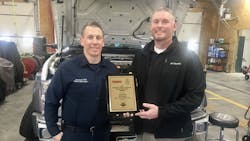The first impression you get from a conversation with 2020 Emergency Vehicle Technician of the Year Jarrett Hill is how humble he is, and it's worth pointing out given how vital his efforts are in keeping the rigs running across three Colorado counties.
Jarrett not only serves as the full-time EVT and fleet manager for the Rattlesnake Fire Protection District in northwest Elbert County, but he also assists roughly a dozen outside agencies in Elbert and neighboring EL Paso and Douglas counties with repairs and maintenance of their fleets.
"I have an assistant that helps me in the shop, shuttling parts, but it's just the two of us," Hill said during a recent interview with Firehouse when he was asked how he manages to stay on top of such a large workload.
Beyond keeping the apparatus running across so many agencies, which would normally be more than enough to keep any Master-level EVT busy, he is also a fire captain with all the necessary certifications who runs the training division for Rattlesnake.
"During the day, we work four (10-hour shifts) here in the shop and we have all the apparatus here to respond, and then in the evenings and on the weekends it's all volunteer," Hill said. "I do that and I do all the fire training for the department. I've got my certifications in Driver/Operator Pumper, Fire Officer, Firefighter I, Firefighter II, all my Proctor certifications. I run the fire training division here and I teach all the new firefighters hazmat, driver/operator and firefighting."
You could say that Jarrett Hill is a jack of all trades in his small corner of the national fire service, and his journey to reaching that status began with an interest and natural aptitude for the mechanic's trade.
Jarrett received a full scholarship out of high school from the Ford Motor Company and earned an Associates Degree in the Ford ASSET Program, later working at a dealership before going on to achieve certification as a Senior Master Ford Technician.
His introduction to the fire service came after he relocated to Elbert County and began volunteering and training as a firefighter with Rattlesnake in 2006. Some members of the Denver Fire Department had come out to Rattesnake shortly after that to teach a ladder class, and when they realized that Jarrett was mechanically inclined, they informed him that Denver Fire was seeking an EVT and that he should apply.
"The thought had never crossed my mind until then," Hill said, "so I looked into it and wound up applying with Denver Fire and Parker Fire and ended up getting the job with Parker, which later became South Metro Fire. I worked there for eight years and started going down the heavy truck path and the EVT path and ended up getting the three certifications—Master Fire Apparatus, Master Ambulance and Master ARFF—and meanwhile I was still volunteering out here at Rattlesnake as a firefighter/EMT and also working on their fleet."
It was around this time that Rattlesnake's chief wanted to bring Jarrett into the agency full-time as fleet manager.
"So the chief came up with a job position and the board approved it, and I ended up coming out here to Rattlesnake full-time to manage the fleet and do outside work for other agencies, and it just kind of grew from there," he said.
Since moving into this full-time position in 2016, Jarrett has maintained a steadfast dedication not only to the pieces of apparatus he works on, but also to the customers and agencies he assists by educating them on repairs and helping them keep proper maintenance schedules.
And dealing with a variety of agencies with different fleet makeups provides him with a wide array of vehicles and manufacture dates to work with.
"It's kind of interesting in my position working for all these different agencies, a lot of them being smaller and some bigger than Rattlesnake, you get a very wide range of apparatus," he said. "Some volunteer departments way out east, they're still running a 1978 Ford L9000 as their frontline truck. It's kind of neat to be able to work on such a wide range, from something close to brand new like a 2017 Pierce to a 1978 Ford. It's very interesting to see the range of apparatus.
"We have three very large pumper/tenders here at Rattlesnake. They're kind of a weird truck that Darley built back in the day, and it seems like any training I've gone to people have heard about them. They're basically 70,000-pound pumper with six-wheel drive. Those are very unique trucks to work on. They're definitely not a traditional pumper. They have a lot of little nuances with them that you learn as you work on them."
Jarrett's accomplishments as a fleet manager and mechanic give you a sense of his dedication to the craft, but when you tack on his continuing work as a firefighter and training officer, his drive to stand out and excel truly comes into focus. Having a hand in both facets of his department also provides opportunities where one role complements the other.
"It actually is a big benefit," Jarrett said of being both a firefighter and EVT. "Just the fact that firefighters can come to you and say 'We want this mounted here' or 'This isn't working right,' you understand what they're talking about because you've been out there. You've operated the nozzles, you've pulled the handlines, you've been on scene, so you get where they're coming from and it makes more sense when they come to you with requests or they have problems."
"Being a fire mechanic, you really get to know the trucks, so when you're on scene and something doesn't work quite right, you can pretty easily circumvent it because you know how the truck works. Say for example the tank fill valve isn't working. You understand how the plumbing works so you know that you can run a hoseline from your discharge back into your direct tank fill in the back, which does the same thing as your tank fill valve. I've had to do that on scene before."
"You're able to adapt if something doesn't work quite right, because inevitably that's going to happen. And that's what I teach my engineers, that it's never going to go as planned, so how do you adapt and overcome to get the results that you need?"
Being involved in fireground operations also removes any separation his fellow firefighters might feel if he were working at an EVT shop at a different location. Jarret currently does his maintenance work out of a fire station, although there are plans to develop a dedicated maintenance shop down the road.
"It also gives you a sense of camaraderie and respect with the crews when they know that not only do you work on the trucks and fix the trucks, but you're also in that firefighter brotherhood and responding to calls," he said.
Continuing his own education and that of others in the trade is vital to Jarrett since, as he puts it, "the truck are always evolving." He has taken on the role of Academy Director for the Colorado Fire Mechanics Association and believes that it's his duty to pass along his knowledge and promote safety both for the members of the fire service and the community.
"A mechanic's eye can't be on every piece of apparatus all the time, so the more education you provide to other mechanics and other operators, the safer the rig is going to be, and that's of huge importance to me," he said.
Jarrett also offered some simple advice for other emergency vehicle technicians, be they veterans of the trade or just starting out in their careers.
"I would say that you should keep pride in your work," he said. "You know, in every facet of the fire service everyone thinks of the firefighters, but there's a bunch of support that goes to the firefighters. If the trucks don't start and the ambulances don't run, then firefighters can't do their jobs. And the same can be said about fire prevention, fire investigation and all the other facets that are a kind of unseen by the public, that operate in the background. Without all those different entities, the fire department doesn't operate."
"One of the sayings is 'Without us, the pride don't ride' and it's kind of a funny saying, but it's true."
About the Author

John Kosik
John was the managing editor of Firehouse after joining the Firehouse team in April 2017 after spending most of his career in journalism writing and editing sports and music content for the Associated Press in New York City. Transitioning into coverage of the fire service industry was a move close to his heart with several friends and family members serving in the FDNY. He lives in Chicago.
